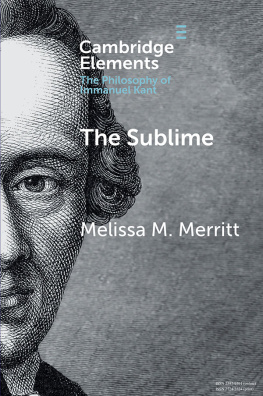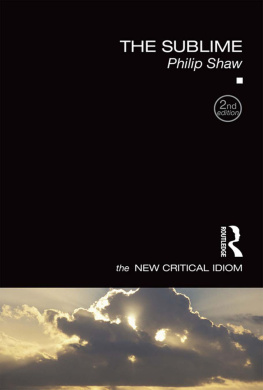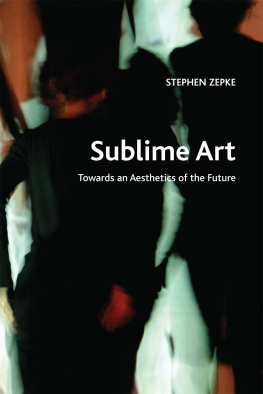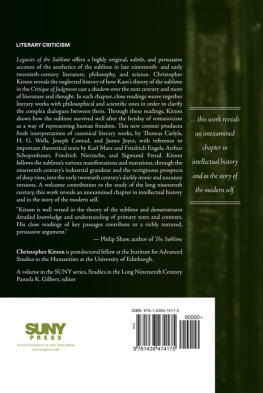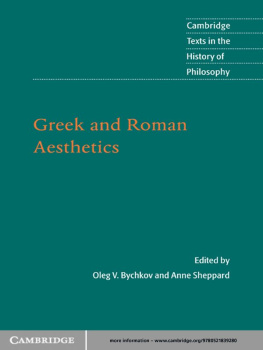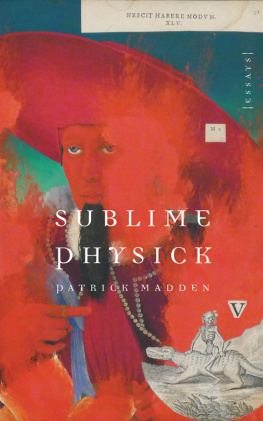Longinus - Longinus on the sublime
Here you can read online Longinus - Longinus on the sublime full text of the book (entire story) in english for free. Download pdf and epub, get meaning, cover and reviews about this ebook. publisher: Shrimpton, genre: Science. Description of the work, (preface) as well as reviews are available. Best literature library LitArk.com created for fans of good reading and offers a wide selection of genres:
Romance novel
Science fiction
Adventure
Detective
Science
History
Home and family
Prose
Art
Politics
Computer
Non-fiction
Religion
Business
Children
Humor
Choose a favorite category and find really read worthwhile books. Enjoy immersion in the world of imagination, feel the emotions of the characters or learn something new for yourself, make an fascinating discovery.

Longinus on the sublime: summary, description and annotation
We offer to read an annotation, description, summary or preface (depends on what the author of the book "Longinus on the sublime" wrote himself). If you haven't found the necessary information about the book — write in the comments, we will try to find it.
Longinus on the sublime — read online for free the complete book (whole text) full work
Below is the text of the book, divided by pages. System saving the place of the last page read, allows you to conveniently read the book "Longinus on the sublime" online for free, without having to search again every time where you left off. Put a bookmark, and you can go to the page where you finished reading at any time.
Font size:
Interval:
Bookmark:

This is a digital copy of a book that was preserved for generations on library shelves before it was carefully scanned by Google as part of a project to make the world's books discoverable online. See the back of the book for detailed information.
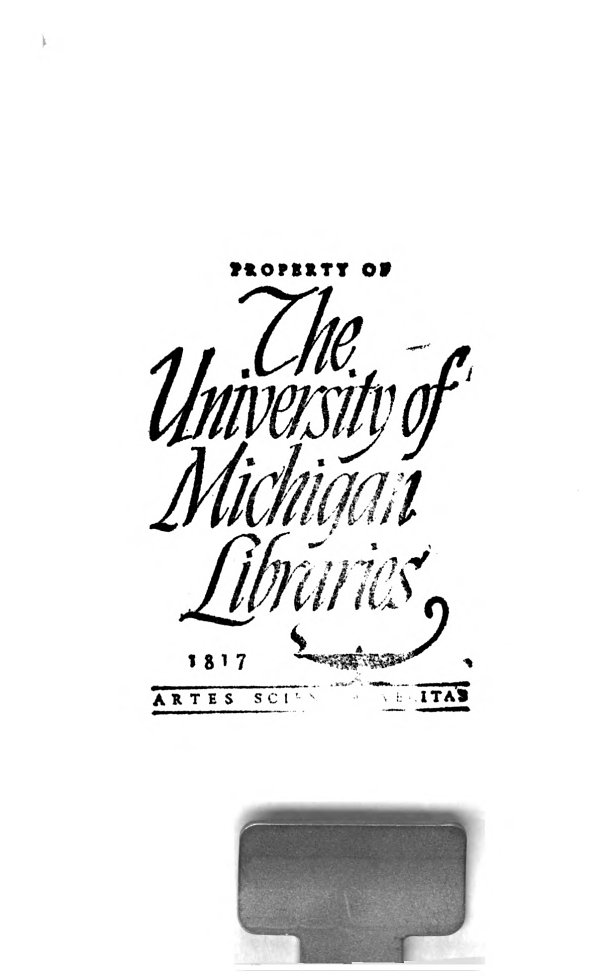



PREFACE.
There are many reasons why this book should be valuable, if, as a preliminary to conferring advantages, it secures that distinction for itself, which in literature is the primary one, and above all others essential to value,the tribute of the reader's time, together with the homage of his attention. The treatise for which I make this claim discusses an important subject; it is distinguished at once for its brevity and fulness; its precepts many times are practically illustrated by the manner of conveying them; the style is moulded after great exemplars; the sentiments interspersed among its rules of art have themselves that moral grandeur without which even the highest genius cannot rise into sublimity; its criticisms are almost invariably just, acute, and penetrating, and there is this nobility of feeling conspicuous in them all, that their praise and censure go hand in hand. It is not the way of Longinus to cull the absurdities and faults of any writer, unless he can also praise him for some quality of excellence or gather from his works some passage to be commended. There is a certain heroism in conduct of this sort, when a man will grapple with none but a worthy antagonist, and rightly feels that a composition, which is not worth praising, is likewise not worth abusing.
The word, which has given a title to the work and a glorious epithet to its author, is the translation of a Greek substantive which means in the first instance simply "height." That simple expression of a physical relation easily adapts itself to the most stupendous concep
r
tions; it supplies, for instance, in Isaiah, the basis of the divine comparison, "As the heavens are higher than the earth, so are my ways higher than your ways, and my thoughts than your thoughts;" the "high hand" is the symbol of power irresistible; the "king that is higher than Agag " is the Lord of the whole earth. The "height" of which Longinus has written touches indeed, as he shews, sublimity in general, the moral as well as the intellectual Sublime; but his especial branch of the subject is elevation of style, loftiness and grandeur of language, the attainment in the spoken or the written thought of splendour and magnificence and awe-commanding majesty. He seeks to lay down rules, to set forth examples, to explain the means, whereby the mind that has in it any spark of native genius, any self-consciousness of noble capacity, may rise above the common level, and spurning even the middle flight of ordinary ambition, wing its soaring way into "the empyreal air.""
The treatise of Longinus, then, is a treatise upon oratory, a treatise upon eloquence in general, a discussion of the supreme excellence of language attainable or to be aimed at either in "prose or numerous verse." But while framing its canon of the Sublime from the masterpieces of antiquity, it so unfolds the secret springs of success as to encourage all noble endeavour, even on the part of those who cannot hope to approach or equal the few masterminds, who seem, in the marvellous originality of their genius, not so much to have obeyed the rules of Art, as, by their own performances, to have given Art her laws.
The Englishman, dull and unready in conversation, not eager for amusements, caring for few things but his business and his fireside, is nevertheless not merely open to the influences of eloquence, not merely keenly alive to its excitement, but beyond all other men seeks it as his necessary intellectual aliment, bows down either to the reality or the semblance of it, and orders his life according to its dictation. In England the education of the multitude is effected (or has been hitherto) not so much by national schools and regular teaching, as by newspaper eloquence; the government of the country is entrusted, sometimes indeed to one party and sometimes to another, but always to the ablest parliamentary speakers; the limits of the national church are maintained and extended, not by its rich and dignif1ed benefices,for on what principle are they distributed rnot by the splendour of its ceremonial, for there is no such splendour existing; not by the superstition of ages, for its faith is challenged unceasingly; but, if we look only to second causes, in the main by the voices and the writings of its preachers and apologists. Accepting it therefore as an axiom that noble expression is the outcome and bloom of lofty thoughts, and that grand thoughts spring only from great and exalted minds, we may trace an immediate connection between the object of this treatise and the well being of our country. And though it be true that many noble-minded men cannot express their thoughts with corresponding eloquence, it is no less true that it would be a great boon for the world if they could; and that in a nation like our own, wherein so much depends on this capacity, it is a culpable piece of indolence to neglect its cultivation, and a lamentable error to suppose t hat one of the noblest and most powerful faculties of our nature is improper to be used in defence of reason and religion, because it is sometimes exerted, and, partly from this very mistake, exerted successfully, to their hindrance and discredit. For let this be borne in mind, that if truth and falsehood, the honourable and the base, wisdom and foolishness, be equally drawn by the highest skill of eloquence, and with her fairest colours, the pigments used in portraying truth and virtue and good counsel, being mixed with the sunshine of their inborn godlikeness, will infallibly cause every rival hue to pale before them by the sweetness and the splendour of that internal illumination.
The Longinus of history is as noble in character as this work is admirable in its precepts. Nevertheless it should not be concealed that his claim to the authorship of this characteristic performance has of late been questioned though not disproved. The remains of his writings however are so extremely scanty that the question thus raised must probably remain for ever in abeyance. A solitary manuscript has preserved to us this immortal fragment, but the profane hand of Time, like Diomede wounding the gods, has been able to impair although not to destroy it. In two or three places the M.S. fails altogether; in three or four others its readings seem to warrant the hazardous attempt at emendation. In one or two isolated instances the author illustrates his own maxim that absolute exemption from faults is not an attribute of the highest genius.
As a translator I owe my acknowledgments to the Latin Version by N. Morus, and in an ampler degree to the copious and learned notes of Ruhnken and others, laboriously compiled and revised by Benjamin Weiske, who appears to have died, pen in hand, while engaged in the task of arranging them. In revising my own performance, I have read with pleasure the elegant French translation by Boileau, and have further compared it with an English rendering by a Rev. William Smith, dated 1739.
Font size:
Interval:
Bookmark:
Similar books «Longinus on the sublime»
Look at similar books to Longinus on the sublime. We have selected literature similar in name and meaning in the hope of providing readers with more options to find new, interesting, not yet read works.
Discussion, reviews of the book Longinus on the sublime and just readers' own opinions. Leave your comments, write what you think about the work, its meaning or the main characters. Specify what exactly you liked and what you didn't like, and why you think so.


